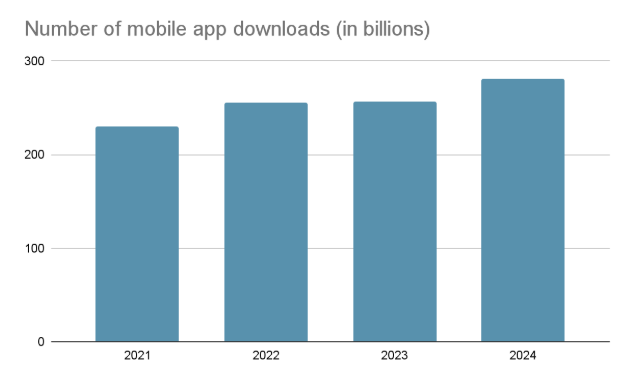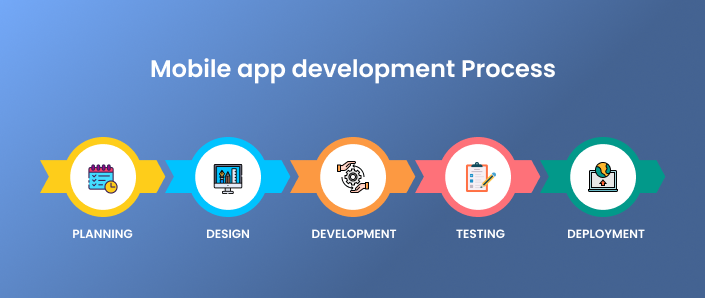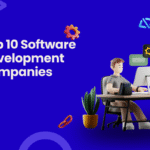Modern life is incomplete without the use of mobile applications. Whatever the purpose or need, there is a mobile application for all to have it perfectly served. This pushes the demand for custom mobile app development services as every business sector is looking to invest and connect with its mobile audience.
As per the latest reports, mobile apps will generate $575 billion in revenue by the end of the year 2025. So, the scope of investment is huge with a user spending more than 4 hours on mobile applications daily on average.
If you plan to invest in mobile app development, the first thing you need to have sorted is the platform for developing the same. This is why we are here to help you with some of the best options you can consider regarding their features, perks, and associated costs. Read on.
Mobile App Development Platforms: An Overview

More than 218 billion applications were downloaded in the year 2024. So, it will not be fair to your business to avoid stepping into the world of mobile applications. However, the first step they need to take is to get to the right mobile app development platform where the application will be built according to their specific needs and requirements.
It is basically a framework that allows developers to work on different types of mobile applications. These types of frameworks come with a unique set of features and tools that make the development and management process easier.
Before moving ahead to the top platforms you have in option, you need to know that there are 3 times of mobile app development frameworks. Below we have discussed all about it to move ahead with clarity.
Mobile App Development Framework Categories
As specified above, there are 3 types of mobile app development platforms that you must understand before choosing the right option. Check it out.
- Native Platforms: These platforms are used to develop mobile applications for a particular operating system, such as iOS or Android. They are known for providing great applications with exquisite performance and complete access to device attributes.
- Cross-Platform Frameworks: Another form of mobile app framework that you must know about is cross-platform, which is known for developing applications that can run on different operating systems. All this is possible with a single codebase like Flutter or React Native. This is why it has become one of the most popular options for developers around the world: it saves a lot of time.
- Low-Code/No-Code Platforms: The last option in the world of mobile application development frameworks has to be low-code or no-code platforms where developers can create applications with minimal coding experience. All this can be done using visual interfaces perfect for making quick rapid prototyping options.
Now when you are clear about the different types of platforms available in place, let’s check out the best options available in these types to move ahead with conviction.
Top Mobile App Development Platforms

1. Flutter
The first and the most popular option for your development needs is Flutter. Google has developed this platform and is an open-source framework that helps developers around the world to come up with natively compiled applications for all devices. In fact, it will also help you create mobile, web, and desktop applications with the use of a single codebase. With this framework, you will benefit from a fast development cycle that will certainly assist you with on-time delivery.
Key Features:
- Hot reload for instant updates.
- Rich widget library for customizable UIs.
- Strong community support.
2. React Native
Another popular option around the world is React Native which is known for providing a near-native experience while helping you develop JavaScript and React mobile applications. Meta has developed this platform and is highly acclaimed in the business for providing the benefit of a single codebase for getting Android and iOS applications.
Key Features:
- Large ecosystem of libraries.
- Hot reloading capability.
- Strong community backing.
3. Xamarin
Another popular name in the list of mobile app development platforms is Xamarin as it helps you develop native applications using .NET and C# programming languages. Microsoft designs this particular framework and it comes with a wide range of development tools for cross-platform applications that make the entire process easier and hassle-free.
Key Features:
- Code sharing across platforms.
- Access to native APIs.
- Integration with Visual Studio.
4. Ionic
If you are looking for an open-source platform for hybrid applications then there cannot be a better option than Ionic. It will help you come up with applications using web technologies like HTML, CSS, and JavaScript. One of the primary reasons behind its success is that it helps develop cross-platform applications much quicker.
Key Features:
- Extensive library of pre-built components.
- Easy integration with Angular and React.
- Support for Progressive Web Apps.
5. Mendix
The last name in the list has to be Mendix as it is one of the most popular low-code platforms that helps develop enterprise apps quickly and efficiently. So, if you are looking for a platform that can help you have an application without much coding needs, then it has to be the way to go.
Key Features:
- Drag-and-drop interface.
- Collaboration tools for teams.
- Built-in deployment options.
6. Sencha
If you are looking for a high-performance platform to work on HTML5 mobile applications, you can always consider going for Sencha. It helps you develop an exquisite development environment but also assists you in building powerful mobile and web applications. You will benefit from 50 built-in themes, components, and an MVC system.
Key Features:
- Supports cross-platform app development
- Provides smooth, natural scrolling mechanisms
- Integrates with Apache Cordova APIs
7. Apache Cordova
When using Apache Cordova, you will be able to work with standard web technologies including HTML5, CSS3, and even JavaScrip to develop custom mobile applications for different platforms. In fact, with the help of this platform, you will have the application developed with access to a camera and GPS as well.
Key Features:
- Being able to use a single codebase.
- Get plugins for accessing native device functionalities.
- Supports various Operating Systems
8. Android Studio
Last but certainly not least, you can always consider opting for Android Studio. It is the primary development platform for the Android operating system and comes with a wide range of tools for building several Android applications. One of the best parts of using this platform is that it helps you develop apps with excellent performance and usability.
Key Features:
- Rich layout editor
- Drag-and-drop capabilities.
- Supports Kotlin and Java programming languages.
- Built-in performance analyzers and testing tools.
Mobile App Development: Costing Considerations
The second thing that comes to your mind after frameworks is the cost of mobile app development. Below are some essential factors that play a key role in defining the overall costs. Check it out.
- Platform Choice: The first and the most essential factor is platforms as developing on native platforms can cost you a bit higher compared to other frameworks.
- Complexity of Features: If the application requires more complicated attributes, it might take time and eventually cost you a lot more.
- Team Location: The region where you hire developers also plays a key role in defining the overall costs of the mobile application development.
- Maintenance and Updates: Lastly, regular support and updates also make an impact in terms of cost for your mobile app development.
As per the latest reports and research, the custom software development cost can be around $30,000 to $80,000 per the above-given factors and needs. With LL Technolab you get quality applications without costing you the bank. Now when you are clear about all the essential aspects related to mobile development, below we have the process covered in brief for you to get going without any confusion whatsoever.
Mobile Development: Process Followed By The Experts
Developing a mobile application goes through several stages and phases to come up with the product exactly as required. Below are the essential steps that are followed around the world. Check it out.

- Planning
The first and most essential step is clarity regarding what needs to be achieved and what needs to be done for whom. So, you need to get your objectives clear and have a complete understanding of the target audience. After this is clear, you must also fix a budget for the overall process.
- Design
After you have everything sorted, the next essential step is getting clarity in designing. You tend to work on wireframes and prototypes to get clarity about the kind of design you would like to have that can assist you with better user experience and engagement.
- Development
After the designing part is sorted and approved, we connect with mobile app developers to help you build the application with actual coding. Here the technologies and platforms are chosen to help you with the perfect application as expected.
- Testing
During and after the development process, you need to work on rigorous testing of the application across all devices. This can help you understand whether all the functionalities of the application are working fine or not.
- Deployment
Lastly, if the testing phase goes bug-free, you must move ahead toward deployment and launch the application on the relevant stores to get it live as planned.
Final Take
Developing a mobile application requires a lot of strategies but once you have the platform sorted, things do get easier. So, you must find the right mobile app development platform to come up with an application that matches all your needs. We at LL Technolab always help you match your expectations with excellent-quality apps within your specified budget constraints. We will understand your specific needs and then choose the right framework to help you with an enterprise app development service that serves all your needs. Invest in mobile for a greater reach!






